Interview with Kirsha Kaechele about the Ladies Lounge
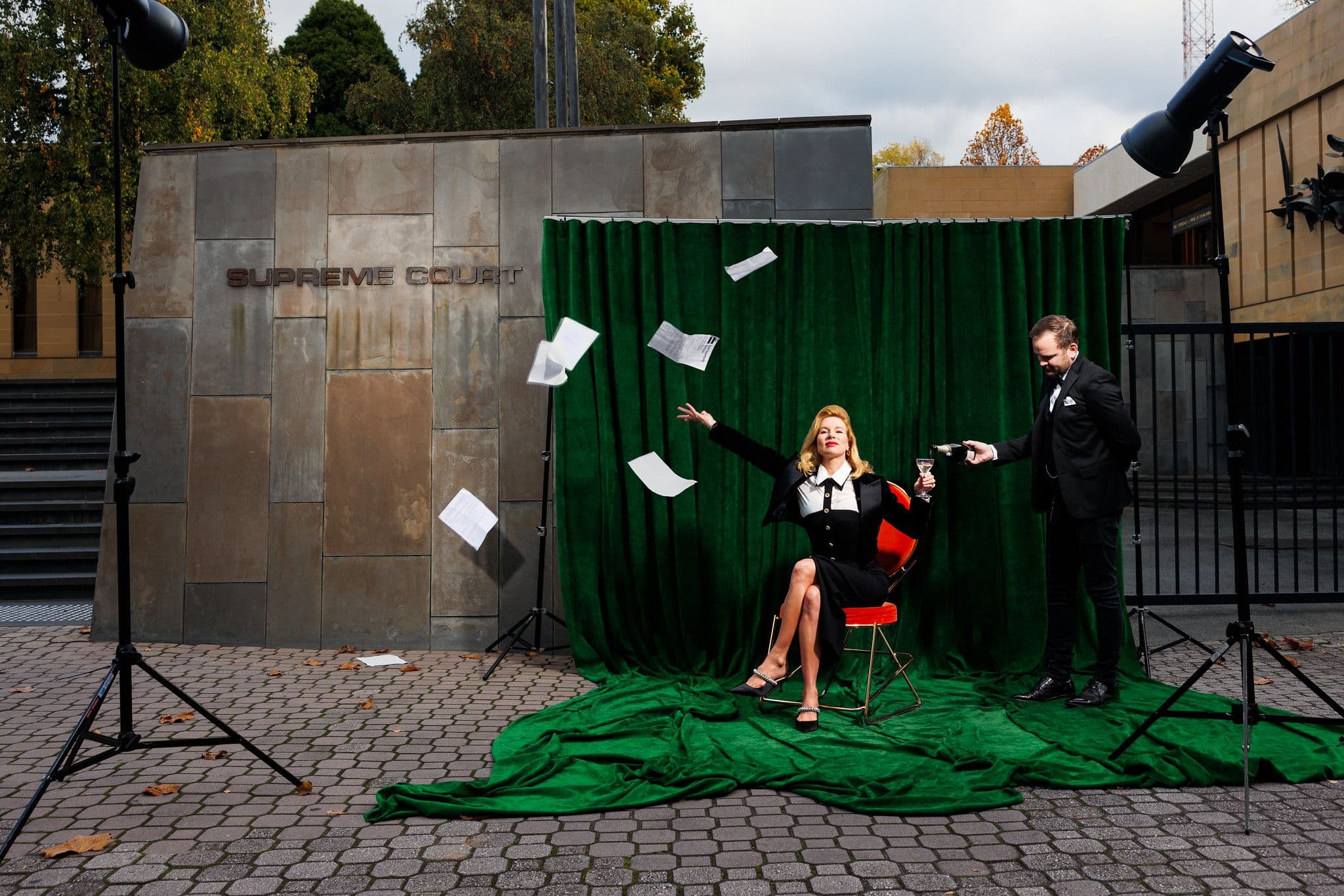
In a recent ruling by the Tasmanian Civil and Administrative Tribunal, artist and curator Kirsha Kaechele was ordered to allow men entry to the Ladies Lounge, her artwork at Mona. On a recent flight to Milan, Kaechele sat down to discuss the court’s decision and the future of the artwork.
Cameras were not permitted in the courtroom, so court sketch artists captured the proceedings. A stenographer was also present.
Have you decided what you will do with the Ladies Lounge? I think what everyone wants to know is, will you be appealing?
Am I appealing? That’s a great question. My husband certainly thinks so, and so do the butlers. I would like to appeal, but first I need to know that it would benefit not only my art, but the law, the world and women in general. What is clear—and the judge has made this very clear—is that to remain open, the Ladies Lounge must ‘reform’. I was certain it was beyond reform, but thanks to my very painful, court-mandated period, which I’ve now completed—a 28-day cycle of, you know, absorbing everything—and to the suggestions of many creative people, I’ve realised the artwork is not beyond reform. In fact the Lounge already possesses many of the redeeming qualities listed in the verdick that would make it eligible for an exemption under section 27 of the Anti-Discrimination Act 1998 (Tas). Where it isn’t already eligible, a number of minor adjustments should bring us into compliance.
The law states that a person may discriminate on the ground of gender:
(a) in a religious institution, if it is required by the doctrines of the religion of the institution; or
(b) in education, if it is for the purpose of enrolment in one-gender schools or hostels; or
(c) in employment, if it is for the purpose of the residential care of persons under the age of 18 years; or
(d) in employment, if it is based on a genuine occupational qualification or requirement in relation to a particular position; or
(e) in accommodation, if it is shared accommodation for less than 5 adult persons; or
(f) in the provision or use of facilities, if those facilities are reasonably required for use by persons of one gender only.
You believe the artwork can continue to operate under a legal exemption? Which of these exemptions will apply?
All of them.
All of them. These exemptions represent very divergent categories. How can the Ladies Lounge possibly meet them all?
By taking a holistic, systems-based approach. Which sounds serious, but really it’s just the art of problem solving. Because everything is connected, adjusting one element of a system can bring the entire system into alignment, making space for nature to do what it does: emerge. Emergence is nature being itself, and I’m endlessly awed by it. And this applies to art too. I tried to explain this to the judge with the phrase ‘God is the curator’.
Yes, I read the court stenographer’s text:
The Artist describes her experience of an artwork’s genesis, which may proceed from a ‘spark’ or a ‘slow evolution’. She explains that she is a ‘vessel’ within which ‘the artwork builds itself'. To irritate her atheist friends, she uses the expression ‘God is the curator’ to describe how it feels for a work of art to come into being through her, noting that in Western tradition, this may seem like a paranoid delusion. However, she says, she reads New Scientist at bedtime.1
Yes, you could just as easily say Nature or the Universe is the curator. God’s just more fun—it’s racier, which works well from the standpoint of our exemptions, but I’ll come back to that. When applied to curating or art-making, it simply means dissolving oneself into a flow state where everything unfolds perfectly. And you feel more like a witness than the creator. It’s what makes me think we live inside a VR program, or that there is a God, or that the universe is just really fucking cool. But importantly, this approach can be applied to section 27 of the Act, and the exemptions noted above. By making space for these exemptions to surface, and meditating on and recontextualising the problem, a series of interconnected solutions unfold and reveal themselves. The problem becomes fodder for the artwork, and the artwork emerges. We not only transmute the problem (turn shit into gold) but find an ‘ah ha’ moment that solves many problems at once.
You could say we transubstantiate the problem into the body of Christ.
Amen. That seems like the perfect opener for exemption (1) (a), which permits discrimination on the basis of gender ‘in a religious institution’. How will you meet this requirement?
The Ladies Lounge would become a church.
A church?
Yes. I think it could be a place of Bible study.
Are you a Christian?
No.
Why Bible study then?
Well, Christians have been very unpopular lately. We poke fun at Christianity, and assume it’s a really dumb thing to do—you know, be Christian. And we’re very confident in that conclusion. But as soon as we’re too sure of our position I think it’s a good time to question ourselves. To challenge our assumptions. It’s healthy to stretch. So, I thought it could be good to do a little Bible study.
Is this similar to advocating for women?
Yes. Women and Christians have both been persecuted, in different ways. Women are judged harshly, they’re underestimated, underpaid and dismissed, but they are actually quite cool. Christians …
Are you saying Christians aren’t cool?
Well, they don’t look cool, but that doesn’t mean they aren’t. They might be very cool. And that’s why we need a Bible study.
What will happen in the Ladies Lounge Bible Study?
We will discover many inspiring perspectives expressed in the Bible, and open up to new ideas by reading verses together, such as Galatians 3:28 ESV:
There is neither Jew nor Greek, there is neither slave nor free, there is no male and female, for you are all one in Christ Jesus.
That really is progressive.
Yes, it’s easy to underestimate the Bible. That passage is beautiful, and the whole world could take a page, that very page, from the Bible right now. Of course, as with all great art, the Bible presents challenging concepts as well. Like Ephesians 5:22–24 ESV:
Wives, submit to your own husbands, as to the Lord. Wives should submit in everything to their husbands.
And 1 Timothy 2:12–15 ESV:
I do not permit a woman to teach or to exercise authority over a man; rather, she is to remain quiet.
Geez.
Yes, God could be tough. In Genesis 3:16 ESV, addressing women, he says:
I will surely multiply your pain in childbearing; in pain you shall bring forth children. Your desire shall be contrary to your husband, but he shall rule over you.
Ouch.
Yep. And not always fun, like in Titus 2:3–5 ESV:
Older women likewise are to be reverent in behaviour, not slanderers or slaves to much wine.
I don’t see that going over very well in the Ladies Lounge.
Yes, that could pose a barrier to normal operations.
Still, I believe the Ladies Lounge Bible Study could be quite progressive, straying from a literal reading of, say, 1 Corinthians 14:34–35 ESV:
The women should keep silent in the churches. For they are not permitted to speak, but should be in submission, as the Law also says. If there is anything they desire to learn, let them ask their husbands at home. For it is shameful for a woman to speak.
Wow. The law has been iffy on its treatment of women for some time.
Yes, but the law can be amended.2 And we wouldn’t adhere to that verse. The Lounge would be a safe space for women to come together and learn about the Bible and ask questions.
You know, in biblical times, women were banished to a segregated tent during their menstrual cycles. With their periods often in sync, the tents became places of female community and respite from the male-dominated world. Some women are suggesting I turn the Ladies Lounge into the Menstrual Lounge.
Would you hold a service on Sundays?
No, on Sundays we would open to men.
But if you meet the exemption requirements, why open to men?
Because it’s the nice thing to do. We could use Sundays for personal enrichment and meditation. Consider the Zen proverb: ‘Before enlightenment, chop wood, carry water. After enlightenment, chop wood, carry water.’ The repetition of everyday actions can bring peace to the mind and even spark enlightenment. That is why we would lead men through a moving meditation in the form of ironing and laundry folding. Women can bring in all their clean laundry and the men can go through a series of graceful movements (designed by a Rinpoche and refined by tai chi masters) to fold them. This would bolster our exemption (1) (a) as a religious organisation—and because it demonstrates focused instruction, this would qualify us for exemption (1) (b) as well, as a school.
Of course, the men’s experience of being rejected is educational in itself, and qualifies the Ladies Lounge for this exemption with no changes whatsoever.
But I actually think the lawsuit is a blessing in disguise. The verdick encourages us to move beyond the simple pleasures of champagne and expensive art. Thanks to the ruling, we have no choice but to open ourselves to a whole range of enriching experiences—spiritual, educational ... To discover fascinating new possibilities, and to become better.
Can we revisit the exemptions? What other opportunities do you see for reformation of the Ladies Lounge?
It could become a toilet.
A toilet … To meet exemption (1) (f) of section 27 I presume: ‘in the provision or use of facilities’. What would that look like exactly?
A toilet, in a large, green velvet room, with butlers who serve champagne.
While you use the toilet?
Yes, why not? There is a real precedent for people imbibing in the toilet. People enjoy all kinds of substances in there.
Are you encouraging drug use in the Ladies Lounge?
It would be the Ladies Room, in fact, under this new designation. But no, not at all. There are numerous examples of more wholesome activities undertaken in toilets throughout history. I once visited a colonial-era mansion in Manila that had two toilets, side by side, with a chessboard in the centre. So there is real precedent for engaging in a variety of activities in the toilet.
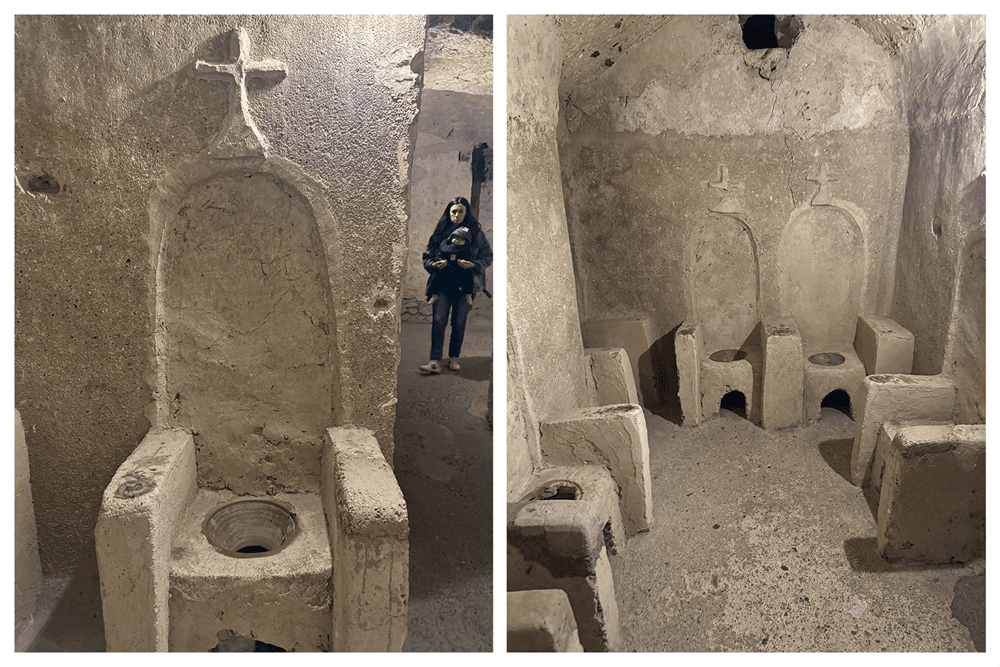
Image for inspirational purposes only. Objects depicted are not holy toilets but Ischian thrones upon which deceased church leaders were placed to slowly decay, with liquid from the process draining into the holes.
Won’t it be difficult to bring plumbing to that part of the museum?
Yes. But as a promoter of sustainable design, I have long championed composting toilets. The world is facing a major water crisis. Aquifers in almost every city are on the brink of literal collapse.3 The world needs to move away from outdated models of sewage treatment. And as a museum, we are socially obliged to set an example. Mona should only have composting toilets. So this is an opportunity to set the model by running a pilot program in the Ladies Lounge. We could do this in collaboration with the University of Tasmania, or the Buckminster Fuller Institute.
Which falls into exemption (1) (b) for education.
Exactly. You’re starting to understand the systems-based approach.
Recent advances in composting toilet design are completely amazing. They are odour-free and need emptying only rarely, at which point the toilet would bestow us with fertile compost to feed our kitchen garden, which in turn feeds patrons in our restaurants. ‘Shit into gold’ has been a conceptual pillar of my art practice for decades, so this is a completely natural evolution for the artwork.
It seems the ruling is supporting the development of the artwork.
It is completely integrated and essential to it. The ruling is the living expression of the art. And it is making the world a better place. Mona’s builder is checking the council ordinances but if they do not already support composting toilets, they ought to, so we will advocate for that as well. In this way, the Ladies Room could become a centre for environmental advocacy and activism. There should be an exemption for that too. I should be able to lawfully discriminate against men for the good of the planet.
But there is another way to approach this. I am currently in talks with the Centre Pompidou for a loan of the legendary artwork Fountain by Marcel Duchamp, a conceptual piece that is a porcelain urinal with the signature ‘R. Mutt’ inscribed on its basin. The work met with unprecedented controversy when Duchamp first submitted it for exhibition at the Society of Independent Artists inaugural exhibition in New York in 1917. ‘Is it art!? Is it a toilet!?’ People were outraged, and the argument has never been resolved.4 It is possibly the most important artwork of our time. But it’s also a toilet (a standard Bedfordshire model urinal purchased by Duchamp from the J.L. Mott Iron Works on Fifth Avenue). Applying the toilet definition and exhibiting it in the space would arguably allow the Ladies Lounge to operate under exemption (1) (d) of section 27.
Moreover, bringing this iconic art object from Paris for display in the Ladies Lounge would reignite the debate: what is art? The inevitable controversy would serve as an excellent art history lesson for a new generation, introducing one of the most important moments in twentieth-century culture—the origins of conceptual art—to a wider, non-art audience. In this sense, the Ladies Lounge would effectively become an educational institution, falling squarely (again) within section 27, exemption (1) (b).
You seem to have pretty thoroughly covered that legal exemption. Are there any other possibilities for the Lounge?
Yes. It could live outside the law; it could become stateless. It could live aboard the Ruby Princess cruise ship for example, and open in international waters 12 nautical miles (approximately 22 kilometres) out at sea. Or I could install it in an airport—one of those stateless, unincorporated tax-free zones that belong to no-one, are officially nowhere, yet are always adjacent to a Gagosian gallery and several high-security private art bunkers full of Monets and other artworks of questionable provenance, not limited to treasures plundered by the Nazis in the Second World War. Maybe Luxembourg Airport, for example. All we need is for one Swiss billionaire to buy the Ladies Lounge and it could operate without exemptions.
And without tax.
Obviously. Personally, I think it’s best placed in an art fair. I think it should go to Art Basel. Or really, the Venice Biennale. It should be its own pavilion. The women-only pavilion.
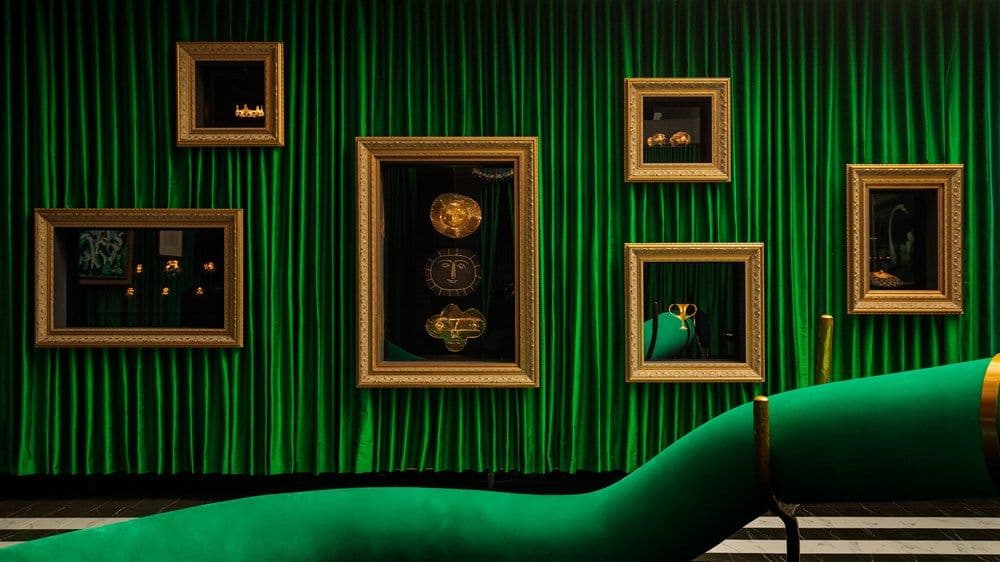
Let’s move to the man who has placed himself at the centre of all this. I notice people have many opinions on Mr. Jason Lau. What is your take on him?
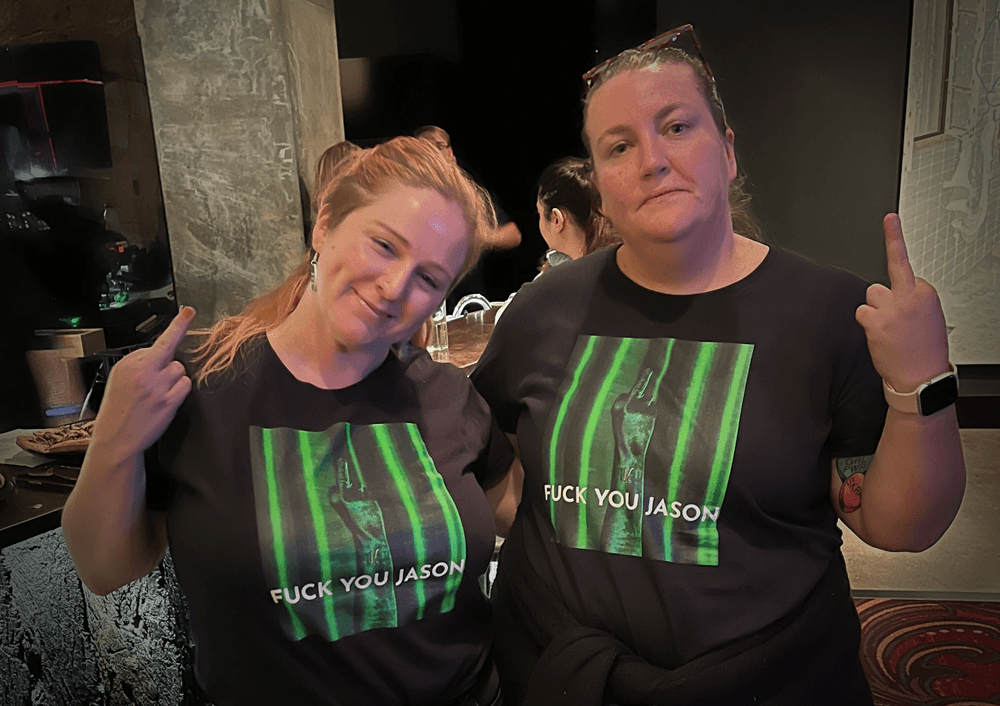
I like him. I think he’s cute. And sincerely interested in the law. It was a pleasure to be courted by him.
So you welcomed the case.
Being taken to court was a dream come true. I was utterly delighted. And I think Mr. Lau was very brave. He brought an earnest and steady resolve.
I am genuinely grateful to Mr. Lau for taking the Ladies Lounge to court, so that we may exercise the argument. He is essential to the art, and I would like everyone to leave him alone now and focus instead on the horribleness of men in general.
Do you think they are horrible?
Yes. They really are.
But you are married to one. Didn’t he pay for this artwork?
Yes, but I fish his recycling out of the general garbage, which is completely horrible. And when you calculate fair pay … It becomes obvious that I paid for the artwork, and the rest of the museum for that matter.
In recycling alone. Any recycling in particular?
Chocolate milk bottles. He won’t let me make raw cacao milkshakes from scratch and instead insists on corporate-funded, factory-farmed, unfair-trade chocolate milk in plastic bottles.
Criminal.
Exactly. He’s literally ruining the world, and that’s just one of the things we women have to put up with. We deserve a lot.
What else do women put up with?
Well, the competing conditions of wife and artist spring to mind. The court ruled that it was largely Mona’s intention for the Lounge that mattered, rather than my intention as the artist who created it. At the same time it suggested that because I am David Walsh’s wife, I can reasonably be considered an intimate extension of Mona and my husband’s will. This aspect of the ruling was made in spite of the following passage from my witness statement:
As seen throughout history, the wife’s work is attributed to the husband. There is no malice here—having been born into and immersed in a society ruled by men, it is natural, logical really, to assume male leadership and initiative. However, I wish to state for the record that the Ladies Lounge (designed by women) was born not of a man’s mind, but of my own; the mind of an important man’s wife. … The question is whether section 104 applies to the intentions of the artist, the museum owner’s wife, who is not an extension of Mr. Walsh’s will, but is in fact an independent entity with ideas of her own, which, in keeping with historic tradition, have been repackaged and presented as the work of a powerful man.
For the record, David is an extension of my will, not the other way round.
You say women deserve three hundred years of reparations in addition to equal rights. Do you think that is fair?
Yes. To equalise historical injustice, it is my assertion that women deserve both equal rights and special privileges (in the form of unequal rights, or chivalry) for a minimum of three hundred years. I’m deeply disappointed by Australia’s abandonment of chivalry alongside the introduction of equal rights, and would like to see its reinstatement as a central element of any reparations package.
Some might find that a little ambitious.
Let the experts decide. There are people who specialise in this. You know, what should BP pay the citizens of Louisiana for spilling oil all over the ocean? What should Big Tobacco pay for giving people lung cancer? What should McDonald’s pay for making everyone chubby? I’m no economist, but my back-of-hand calculation is that three hundred years is quite conservative.
And that is why you have butlers in the Ladies Lounge?
Exactly. They are paying dues on behalf of all men. But it’s nice for them. Germaine Greer says ‘women have very little idea how much men hate them’. It’s quite the opposite with the butlers. We love them. And they adore us.
What exactly are these butlers doing?
They are the only men allowed in the Ladies Lounge, and that is because they live to serve women. They attend to our every desire and shower us with praise and affection (in chivalry—the unequal rights component of the reparations equation). And champagne. They also massage us.
How are other men responding to this?
Enthusiastically. We’ve been flooded with applications for the role! But men who don’t qualify … you know, you must be under the age of 25 and good looking … less so. They’re very upset—on the verge of hysteria in fact. Of course, they’re saying I’m hysterical … And I hope they’re right.
I read in the museum director’s witness statement that he felt you were ‘completely out of control, completely beyond David’s control, and any attempt to [intervene in the Ladies Lounge] would result in an hysterical outburst’. Do you agree with him?
Yes. He also swore, under oath, that the Lounge is a conceptual triumph, which I didn’t pay him to say (my husband did; he pays his salary, or rather I do, through my chocolate milk bottle earnings). So you know he’s telling the truth.
In his ruling, the judge chastised you and your supporters for your performance in court. Do you believe your behaviour was inappropriate?
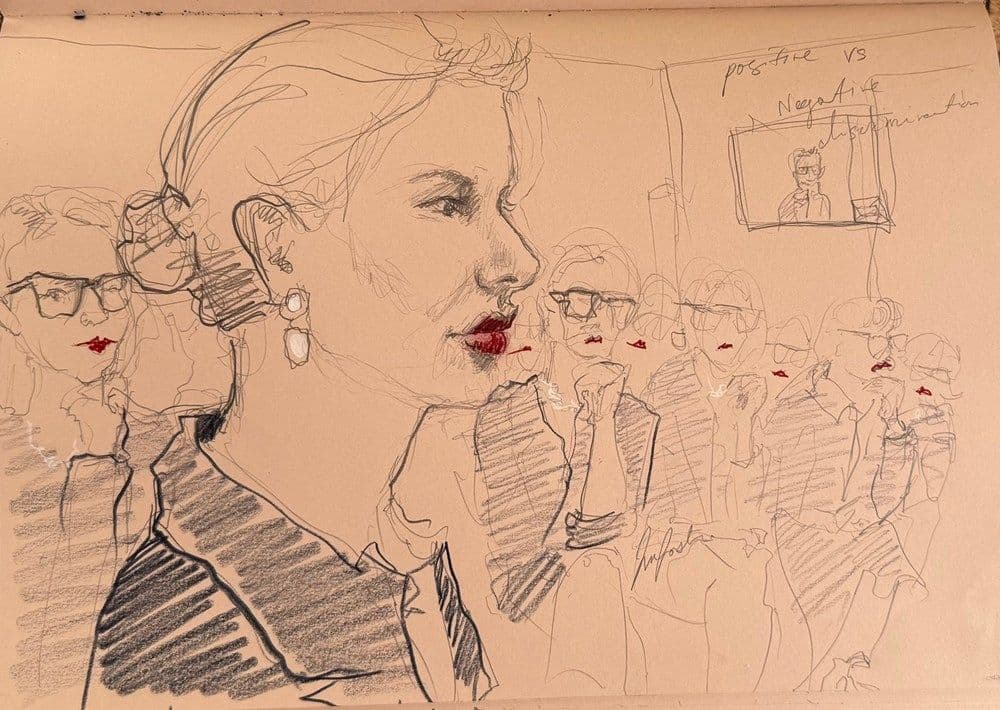
I believe the judge enjoyed the performance very much. I studied his face closely from the witness stand, and he looked genuinely happy. But in his ruling, he wrote:
There is one further matter that I should address. Ms. Kaechele was accompanied to the Tribunal by a group of about 20 supporters, all of whom were dressed similarly to her in a conservative business style of similar colour. They sat in the back of the hearing room during the hearing, largely very still. Although not observed by me during the hearing, I understand that that stillness was punctuated every few minutes by the group shifting their posture in common and in unison in a coordinated manner … one of the group was pointedly reading feminist texts. After I retired at the conclusion of the hearing the group left the Tribunal in a single line in a slow march led by Ms. Kaechele to the sounds of a Robert Palmer song …
This conduct was not observed by me or, I expect, by Mr. Lau who attended the hearing remotely. ... It therefore did not disrupt or influence the hearing. However, at the very least it was inappropriate, discourteous and disrespectful, and at worst contumelious and contemptuous …
Given the appropriate comportment of Ms. Kaechele while giving her evidence and in the course of the hearing generally I expect that the conduct of the group was some form of performance art rather than being calculated to influence Mr. Lau or the determination of his complaint. While it might have seemed to the participants to have been an amusing escapade or an expression of support for Ms. Kaechele, had I formed the view that it was in fact intended for either of the latter purposes, or had the effect of influencing Mr. Lau, I would have been obliged to refer the conduct to the Director of Public Prosecutions to consider prosecution under section 128 of the Tasmanian Civil and Administrative Tribunal Act 2020.
Prosecution? That sounds serious.
Yes. Notice his use of words beginning with dis and com. Men love alliteration in their writing. And obfuscating vocabulary. I had to look up ‘contumelious’: it means scornful, insulting and insolent. Which seems … extreme. We sat in complete silence, punctuated only by the shuushhh of pantihosed legs crossing and uncrossing in our choreography. It’s hard to imagine how we could have behaved in a more ladylike manner. The final movement was to apply lipstick.
As the hugely influential gender theorist Judith Butler argues, gender is a performative construct. To which I’d add: so is the legal system.
Do you mean to say that you think the judge might have been contributing to the art?
I can’t be certain that his ruling isn’t performance. His judge-like ‘comportment’ in the court, the flourish of his language in the ruling ... He’s clearly a man interested in art. In his ruling, he compares me to Caravaggio—a great artist but he also murdered someone. I just served ladies champagne.
1. Danielle Wood, court stenographer, ‘Lau v Moorilla Estate’.
2. And so I am appealing.
3. In the form of subsidence due to over-extraction. See Mira Rojanasakul, Christopher Flavelle, Blacki Migliozzi and Eli Murray, ‘America is using up its groundwater like there’s no tomorrow’, The New York Times, 28 August 2023, https://www.nytimes.com/interactive/2023/08/28/climate/groundwater-drying-climate-change.html.
4. Duchamp’s 1917 original is in fact lost and the Pompidou’s version is one of several replicas ‘readymade’ in the 1960s with his approval. See https://www.centrepompidou.fr/en/ressources/oeuvre/VgrNkuT.
Read the court stenographer's full report here.
Ladies in Navy
Kirsha Kaechele
Loren Kronemeyer (feminist art history counsel)
Eri Konishi
Emma Pike
Kelly Drummond
Risa Muramatsu Ray
Sunny Sutton
Yasmin Mund
Betty Grumble (non-conformist)
Lisa Lods
Belinda Schroter
Slavica Kilby
Michelle Warren
Eleni Arbus
Rebecca Chabot
Sylvia Elphinstone
Emily Wood
Anand Kumar
Hera Fox
Asimina Riga
Juniper Shaw
Marissa Tremain
Court Sketch Artists
Isabella Foster
Natalie Holtsbaum
Arjan Kok
Court Stenographer
Danielle Wood